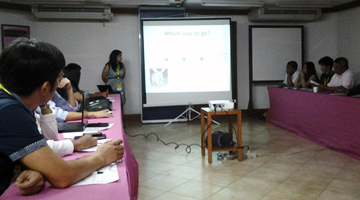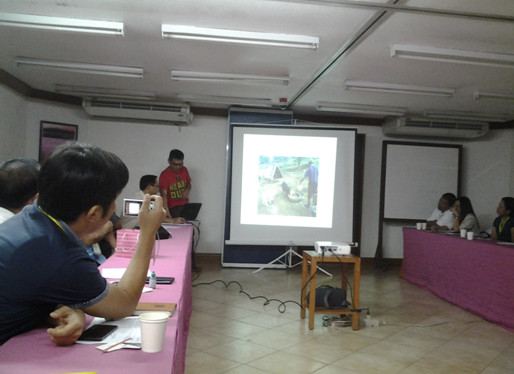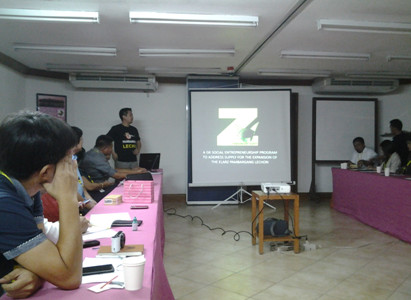 Philippine native animals, with their unique attributes, are gaining popularity among consumers and food service providers.
Philippine native animals, with their unique attributes, are gaining popularity among consumers and food service providers.
Due to this increasing interest, PCAARRD partnered with the private sector, academe, and the Philippine Society of Animal Science in a round table discussion on native animals R&D priorities.
Held recently, the activity provided stakeholders in native animal production, marketing, and R&D from all over the country a venue to validate S&T directions and identify relevant R&D projects that would boost production, processing, marketing and distribution opportunities.
Three perspectives were presented to 39 participants during the event.
From the academe
Dr. Agapita Salces, assistant professor from the Animal and Dairy Sciences Cluster of the University of the Philippines Los Baños (UPLB), presented a paper on the principles, concepts, and recommended practices for sustainable breed development.
Dr. Salces defined native animal as “an animal originating from a particular place or animals known to be present and breeding in the locality for at least five generations;” and owned by the locals in the community.
She highlighted the important attributes of a native animal including its taste; nutraceutical properties; adaptability to the environment; heat tolerance; ability to subsist on low-quality feeds and limited water supply; and ability to withstand extreme weather conditions.
She also emphasized the concept of breed conservation leading towards profitable utilization wherein traits are utilized for the manufacturing of specialty products.
Further, Dr. Salces recommended that conservation efforts for native animals must be community-based programs and must go hand in hand with the efforts of government conservation centers and institutional herds.
From the business sector
 Elmer Rivera, owner of St. Elmo’s Farm, demonstrated how his three-year native pig business prospered.
Elmer Rivera, owner of St. Elmo’s Farm, demonstrated how his three-year native pig business prospered.
Rivera’s production is mainly targeted for “cochinillo”, a grilled or deep fried piglet that is being offered in specialty restaurants. He emphasized the economic benefits of marketing native pigs and its products directly to restaurants and other institutional buyers and/or domestic consumers.
Rivera also shared his daily farm operations. “Pregnant native pigs are provided with deep bedding using hay and/or rice straw. It is important to keep the litter floor dry at all times,” he said.
Wet feeding is practiced using 80% locally available feed materials (cassava rejects, “sakwa” or gabing San Fernando, and rice bran) and 20% commercial feed. For the lactating sow, 100% commercial feed is provided.
He added that mortality is not much of a problem and minimal supervision is required. Neither iron supplementation nor vaccination is needed. Practices performed in commercial farms, such as tail docking and teeth clipping, are not practiced in his farm.
From the view of social entrepreneurship
 Manuel Enrique Zalamea, owner of the ElarZ Pambansang Lechon, envisions creating more livelihood for farmers through a contract-growing scheme. This initiative is implemented through a social entrepreneurship program called the “Pambansang Baboy Project.” As a social entrepreneur, he takes into account a positive return to the society.
Manuel Enrique Zalamea, owner of the ElarZ Pambansang Lechon, envisions creating more livelihood for farmers through a contract-growing scheme. This initiative is implemented through a social entrepreneurship program called the “Pambansang Baboy Project.” As a social entrepreneur, he takes into account a positive return to the society.
Zalamea emphasized that the problem of business today is the supply chain. Native animal producers particularly from the far-flung areas do not achieve optimum economic benefits because of inefficient marketing channels.
With the increasing market for native pigs, their project addresses a major concern of farmers --- sure buyers. With this, best buying price (without the cost from middleman) can also be made available to the consumers.
The project was launched with the Gawad Kalinga (GK), a poverty-alleviation and nation-buiding movement founded by Antonio Meloto.
In GK, Zalamea says, “the rich and the poor can work together to build a strong middle class.”
Issues
The two major issues raised during the forum were the demand for consistent quality and stable supply of native pigs for lechon and standardization of the production protocol for native pigs and other native animals, among other concerns.
Also, issues on marketing and trading systems, strategies, and other locality-specific consumer preferences were brought up.
